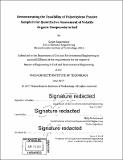Demonstrating the feasibility of polyethylene passive samplers for quantitative assessment of volatile organic compounds in soil
Author(s)
Saparbaiuly, Galym
DownloadFull printable version (6.071Mb)
Other Contributors
Massachusetts Institute of Technology. Department of Civil and Environmental Engineering.
Advisor
Philip M. Gschwend.
Terms of use
Metadata
Show full item recordAbstract
A quantitative assessment of the nature and extent of volatile organic compounds (VOCs) in soil vapors is a valuable tool, as these chemicals are pervasive and a health concern at many contaminated sites. Motivated by the successful use of polyethylene (PE) passive samplers in sediments, this research focused on demonstrating the feasibility of PE samplers to accurately assess volatile organic compounds in soil vapors. Experimental values of PE-water partitioning coefficients (Kpew) for benzene, toluene, ethyl benzene, and ortho-xylene (BTEX) were determined. A benchtop experiment in a controlled environment was performed, which consisted of a jar of sand with known amounts of trichloroethylene (TCE) and tetrachloroethylene (PCE). The concentrations of the TCE and PCE were measured using the PE passive sampler and compared to mathematically estimated results. Finally, the PE passive samplers were tested in an actual site at the U.S. Army Cold Regions Research and Engineering Laboratory (CRREL) and showed consistent results with the available data. The results of this thesis demonstrated that the PE passive sampling is a promising technique to measure VOCs in soil vapors.
Description
Thesis: M. Eng., Massachusetts Institute of Technology, Department of Civil and Environmental Engineering, 2017. Cataloged from PDF version of thesis. Includes bibliographical references (pages 54-55).
Date issued
2017Department
Massachusetts Institute of Technology. Department of Civil and Environmental EngineeringPublisher
Massachusetts Institute of Technology
Keywords
Civil and Environmental Engineering.